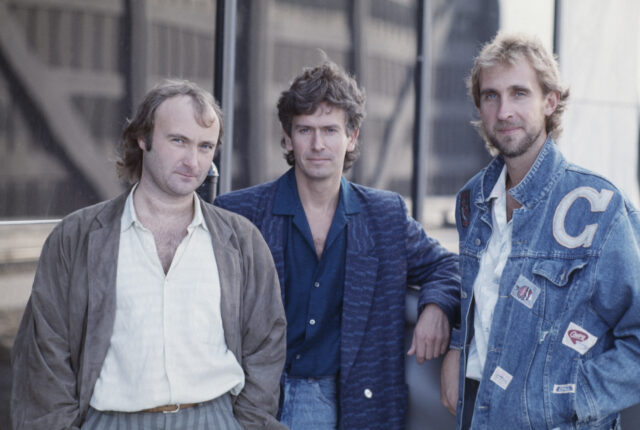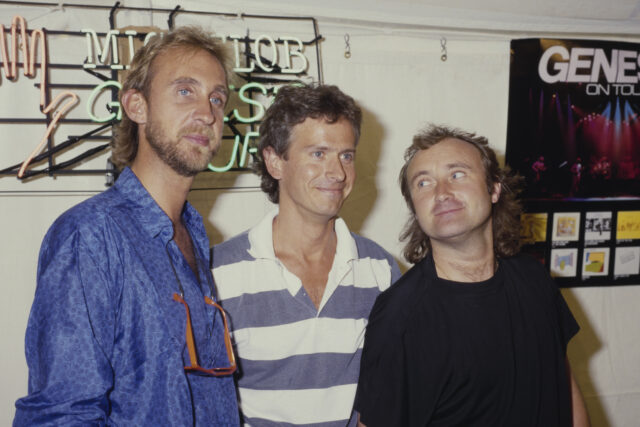Before Phil Collins made a name for himself as a solo artist, he was one of the integral band members of the rock group, Genesis. Along with Tony Banks and Mike Rutherford, Genesis became one of the founding bands of the progressive rock movement. However, Collins would eventually leave the band, and the reasoning is not as clear as you may think.
Everyone thought it was because of a particular song

Genesis was formed in 1967, but it wouldn’t be until 1970 that a 19-year-old Phil Collins was recruited into the band. He first came in as a drummer but soon took over as the band’s lead singer following the departure of Peter Gabriel in 1975. As Genesis became more famous in the 1980s, the band became synonymous with popular pop-rock ballads. While this certainly fostered their fame, it also caused critics to regard the band as mediocre, with the undertone of having sold out their artistic craft for sounds that sell.
Despite these critiques, Genesis continued to produce music, including the song that many attribute as the cause for Collins’ departure from the band: ‘Burning Rope.’ In 1997, Collins said in an interview that he felt that that particular song was “a period piece. It doesn’t make it in the 20th century. I know there are people who like this music, but I just couldn’t get up on stage and play or sing this kind of material anymore.” This really fed the idea that it was this song that was the reason he left. However, the song’s release in 1978 is a bit too early to justify this accusation, as it was almost 20 years later that he actually departed from the band.
It was a while before he actually left

Collins had been considering leaving the band for a while. In fact, it was kind of obvious. Throughout the 1980s, Collins had been dabbling in some solo work while continuing to stay with the band, releasing his first solo album, ‘Face Value,’ in 1981. It featured one of his greatest hits of all time, ‘In The Air Tonight,” which became a huge international success.
When he released another solo album in 1993, titled ‘Both Sides,’ Collins felt a strong sense of pride toward his solo work, which heavily contributed to his decision to leave the band. Following the album’s release, he said, “I felt that I’d arrived at a place, musically speaking, that really was the most fulfilling for me.” Staying in the band no longer felt like a fruitful endeavor, as it became creatively limiting for him.
When Collins made the final decision to leave, he took it to the band’s manager, Tony Smith, before talking to his bandmates. Collins explained how “He said, ‘Well, listen. We don’t have to make any decisions yet,'” and encouraged him to wait a full year to mull things over before quitting the band. However, when Banks and Rutherford brought up the idea for a new album, Collins felt the time had come.
The split was pretty amicable

Collins really enjoyed playing with Banks and Rutherford but still felt he needed to go his own way. Considering all of his solo work throughout the years, the announcement didn’t come as a major blow to the rest of the band. In fact, it was quite an amicable split. “Mike said, ‘You want to leave. We understand. You want to do something else. It’s cool. It could be me, could be Tony,'” Collins explained. “And Tony said, ‘Well, this is a sad day. But I understand.'”
Following his departure in 1996, Genesis released a statement that broke the news to the public. It said, “Genesis … are currently seeking a vocalist.” Collins said he was happy to see that the band was going to continue without him, as he never intended his departure to be the demise of the band. The band’s statement explained his reasoning for leaving, saying, “For the past 20 years, drummer Phil Collins has been temping as a singer, to great acclaim. Now however he has decided to move on in order to concentrate on his solo projects.”
Read more: The Beatles Release Their Final Song Ever – ‘Now and Then’
In 1999, Collins dropped one of the greatest movie soundtracks of all time – Disney’s Tarzan.
